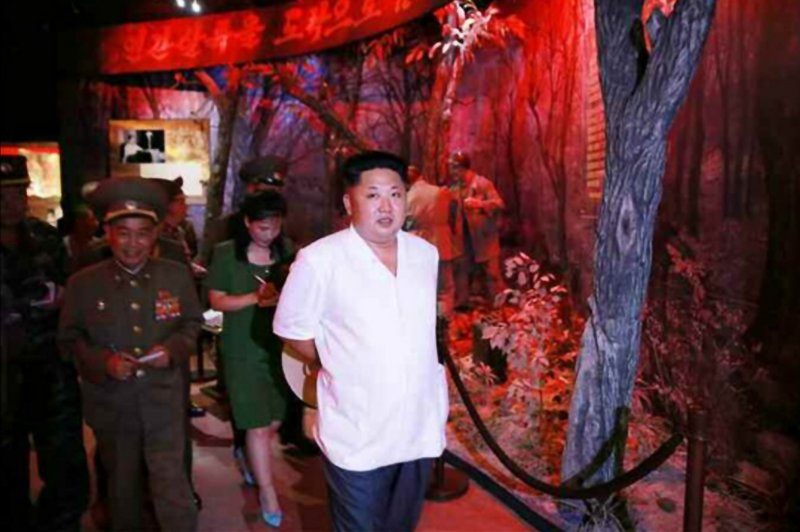1 of 3 | Kim Jong Un tours the Sinchon Museum of American Atrocities in 2015. The museum added new dioramas in order keep apace with "rapidly evolving media," according to an Australian analyst. File Photo by Rodong Sinmun/EPA
NEW YORK, April 2 (UPI) -- North Korea's mission of educating its citizens through propaganda has not diminished under Kim Jong Un, but any changes that have taken place under the current leader appear to have been made with South Korea in mind, according to an Australian analyst.
Christopher Richardson, an independent scholar in Sydney who studies the childhood policies of North Korea, says Kim undertook initiatives that signaled the restoration of power, including reviving The Boy General, a long-running animated series using state-of-the-art animation techniques. The popular cartoon about a young warrior in an ancient Korean kingdom stopped running during the famine years, but aired again in 2015.
"Likewise, Kim ordered the replacement of weary anti-U.S. propaganda paintings in the Sinchon Museum of American Atrocities with startling new Madame Tussauds-style waxwork dioramas," Richardson said in an email to UPI.
The changes are not recent, but few observers have linked the developments to North Koreans' greater access to South Korean media and their heightened sense of the outside world.
"Competing with the lure of South Korean heterodoxy requires keeping apace with rapidly evolving media, rather than adjusting the message," Richardson said.
Through interviews with North Korean defectors in the South, Richardson said he learned North Koreans are navigating a more diversified media environment. South Korean dramas, for example, could be distracting people from nation building.
"I once showed my collection of North Korean graphic novels to three young women who had left during the last decade," he said.
"They laughed and simply said that they had always hated military tales and found them deeply boring."
Similarly, North Korea's construction spree in Pyongyang, including the opening of new department stores and water parks, demonstrates a state need to showcase wealth comparable to the South's, the analyst said.
"The Kim Jong Un era projected a North Korean 'prosperity gospel' in which loyalty to the supreme leader would be rewarded with material benefits, as well as the traditional spiritual rewards," Richardson said.
"Meanwhile, the state was forced to compete with the material temptations of the South."
North Korea's possible modeling of itself on the South is not without irony. Not only do North Korean children continue to be indoctrinated into believing they must sacrifice their lives for Kim, the country has opposed capitalism in its official narrative.
Martin Petersen, a senior researcher and curator at the National Museum of Denmark, says anti-capitalist education begins in childhood. In their formative years, North Koreans read stories, often in graphic novel format, about South Koreans who are portrayed as victims of capitalism and the "gangsters of imperialism," the United States.
The books take an interesting turn when North Korean graphic artists allow their imaginations to run wild, however.
According to Petersen, "spy comics," usually about North Korean spies or "patriots" who go to the South, risk straying into dangerous territory.
"In some of these stories, the North Korean patriots go to the South to fight the enemy," Petersen said.
"But to fight the enemy in many of these stories they have to become like the enemy, become depraved, sort of capitalist personalities, not to be spotted out as being North Korean," he said.
The entertainment value of such stories, where North Korean protagonists slip into a South Korean cloak, may be too much for a regime that relies on the fealty of its citizens, the analyst added.
Regime concerns about popular North Korean fiction has come to reflect political reality in recent years.
Kim's summit with U.S. President Donald Trump raised expectations the two sides would take steps toward historic reconciliation. But as Trump and Kim appeared to be drawing closer, North Korea walked out of working-level talks in 2019.
"Military games and anti-Americanism remain foundational. At the height of Trumpian summitry, there was a notable muting of anti-U.S rhetoric in Pyongyang, yet it did not last long," Richardson said.
"Meanwhile, as sanctions bite and COVID-19 spreads throughout the country, I expect we will see a return to the language of austerity that characterized North Korean children's propaganda in the '90s."















